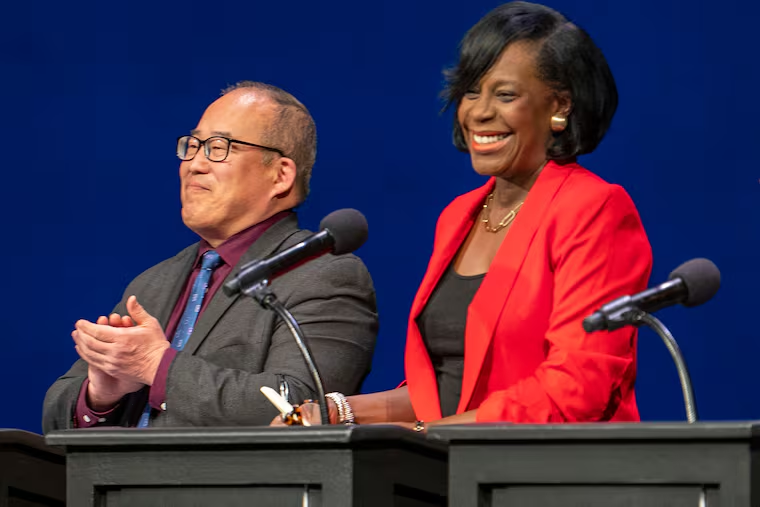Why Cherelle Parker should debate David Oh
Cherelle Parker’s Trump-like refusal to debate David Oh dishonors Philadelphians and upends tradition. It's also downright antidemocratic.

A cornerstone of public service is the willingness of those seeking office to show their worthiness to voters by engaging in public debate. It’s an especially proud tradition here in Philadelphia.
Despite there not being a competitive mayor’s race since 1999, nonincumbent Democrats who win their party’s nomination have debated their Republican and third-party counterparts — until now. Cherelle Parker, the Democratic nominee, has refused to debate her worthy opponent, Republican David Oh — ignoring his continued pleas to engage in this time-honored practice.
It’s a Trumpesque move on Parker’s part.
Earlier this month, the former president posted on his social media website Truth Social that he would “NOT BE DOING THE DEBATES!” because he is already popular and well-known to Americans, citing his current large polling lead over primary rivals. At the first GOP debate of the 2024 election season, Donald Trump did not take the stage.
Maybe Parker holds the same imperial views because of her large lead over Oh. Given that Philadelphia Democrats have a more than 7-1 voter registration advantage in the city — 774,469 Democrats to 114,796 Republicans as of Aug. 21 — Parker is likely to win the November election and take office in January.
Both Parker’s and Trump’s refusal to debate other candidates, just because they are confident they have the majority of the vote, is a danger to our democracy.
I am proud to live in the United States — a nation founded on the principle of the rights of the individual over that of state or sovereign.
The seriousness of our founders’ thinking on this matter was revealed in 2010, when spectral imaging technology found that Thomas Jefferson erased the word subject in the Declaration of Independence and replaced it with citizen. This wasn’t a mere swap of synonyms or syntax on Jefferson’s part — it was a seismic shift in a world ruled only by the divine rights of kings and ruling classes.
In the United States of America, people would be citizens, not subjects. In 1776, the citizen became the penultimate power, foundational to the great democratic traditions that we now enjoy.
One of those traditions is openly and honestly debating your opponent.
Oh understands the importance of debates. “People are hearing less and less opposing opinions,” he said in an interview with The Inquirer when he resigned from City Council to run for mayor. “I think that’s actually not good. I think it’s better when you have a collective wisdom or a common wisdom.”
And that collective wisdom is part of the tradition of our great city. In 1999, Republican Sam Katz and Democrat John Street — both nonincumbents — faced off in a televised debate. Street narrowly defeated Katz by only 7,228 votes. That would be the closest a Republican would come to winning in Philadelphia in recent history.
Since the turn of the millennia, Democrats have coasted, winning each mayoral election by increasingly wider margins. Yet even when Street and Katz rematched in 2003, and Street won handily — this time by 16 points — Street still took to the debate stage to perform his civic duty.
I am concerned with nothing smaller than a citizen’s right to listen to a civic debate among those who seek power. For the good of the city, the commonwealth, and the country, it’s time for Parker to debate Oh, and to show respect for the city she wishes to lead.
“The important thing is that anyone who is running for mayor who wants to be in charge of the city should go before the people, to answer their questions, receive their criticism, and talk about what their priorities are,” Oh told Billy Penn.
He has yet to hear from Parker about any debates or forums.
Parker’s and Trump’s debate avoidance is symptomatic of deeper problems within our political culture — one that permits any political candidate to avoid debates if they are confident they’re going to win. It’s become acceptable that candidates with large leads would be foolish to risk diminishing them by engaging the opposition.
Philadelphians should reject this self-serving campaign strategy and demand civic participation from those seeking office, regardless of likely election outcomes.
According to her campaign spokesperson, Parker will “consider each debate invitation as it comes.”
It’s not too late for her to change her mind.